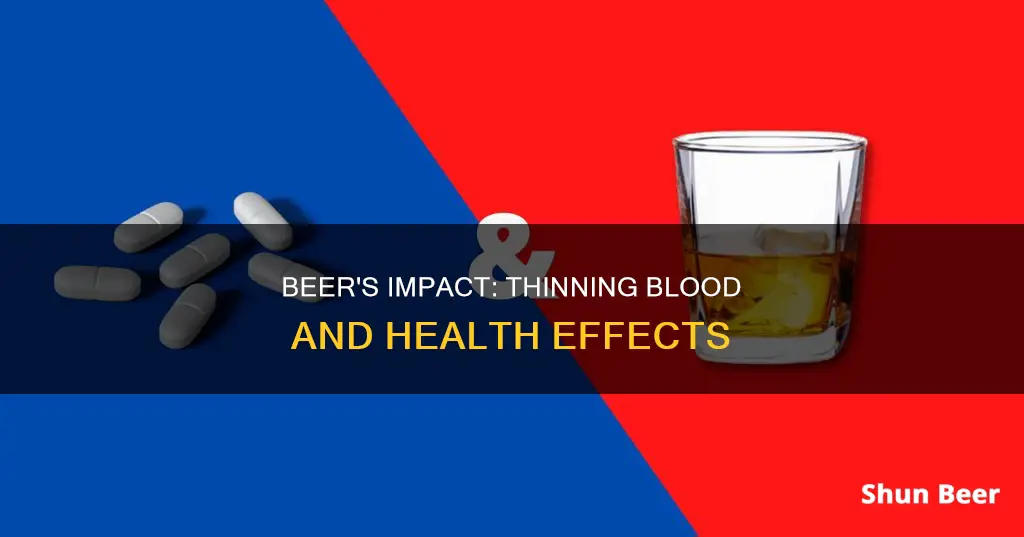
Alcohol consumption is known to have a blood-thinning effect, which can have several implications for health and medication. Drinking alcohol can reduce the ability of blood to clot, as it interferes with the coagulation process, making the blood less sticky. While moderate alcohol consumption may not pose significant risks for most people, it can become a concern for those taking blood-thinning medications, as the combined effects can lead to excessive bruising and bleeding. This is because alcohol consumption can reduce the number of platelets in the blood and make existing platelets less sticky, hindering their ability to clump together and form clots. Therefore, it is important for individuals taking blood thinners to consult with their healthcare providers and carefully monitor their alcohol intake to ensure safe and effective management of their health conditions.
| Characteristics | Values |
|---|---|
| Does alcohol thin the blood? | Yes |
| How does alcohol thin the blood? | Alcohol reduces the number of platelets in the blood and makes the existing platelets less sticky. |
| Is alcohol a blood thinner? | Yes |
| What are blood thinners? | Medications designed to prevent the formation of blood clots or to inhibit existing clots from getting larger. |
| What are the common types of blood thinners? | Warfarin, Heparin, Rivaroxaban, Apixaban, Dabigatran, Aspirin, Clopidogrel, Ticagrelor, and Dipyridamole. |
| Can you drink alcohol while taking blood thinners? | It is not recommended, as it can increase the risk of bleeding. |
| What are the risks of drinking alcohol while taking blood thinners? | Increased bleeding risk, liver function interference, medication ineffectiveness, compromised decision-making, etc. |
What You'll Learn

Alcohol's effect on blood platelets
Alcohol does indeed thin the blood, and this effect is due to alcohol's influence on blood platelets. Platelets are the blood cells that initiate the coagulation cascade, causing blood to clot. When an injury occurs, platelets rush to the site and form a clump, or a plug, to stop the bleeding. This process is called thrombosis.
Alcohol interferes with the clotting process by reducing the number of platelets in the blood and making the existing platelets less sticky. In other words, alcohol consumption hinders the bone marrow's ability to produce platelets and changes their physical makeup, making them less effective at sticking together and forming a clot. This means that when alcohol is in the bloodstream, even minor injuries can result in excessive bleeding because the blood's ability to clot is compromised.
The effect of alcohol on platelets is short-lived in people who drink moderately. Moderate drinking is defined as up to one drink per day for women of all ages and men aged 65 and older, and up to two drinks per day for men under 65. However, for people who drink heavily, there can be a rebound effect where the bleeding risk increases even after they have stopped drinking.
While alcohol's blood-thinning effect might sound beneficial, especially in preventing strokes caused by blockages in blood vessels, the risks associated with drinking alcohol outweigh any potential health benefits. Excessive alcohol consumption is linked to an increased risk of various cardiovascular conditions, including high blood pressure, heart failure, and stroke. Additionally, alcohol can increase the risk of blood clots, especially with daily drinking of significant amounts. Therefore, it is not recommended to consume alcohol instead of taking prescribed blood-thinning medications.
The Michigan Beer Chair: Engineering a Relaxing Experience
You may want to see also

Alcohol and blood thinner medication
Alcohol can thin the blood, and so can blood-thinning medication. So what happens when you mix the two?
Alcohol and Blood Thinners Explained
Blood thinners are drugs that prevent blood clots from forming. Blood clots can block small and large blood vessels, potentially causing serious health problems. Doctors prescribe two types of blood thinners to prevent blood clots: anticoagulants and antiplatelet drugs.
Alcohol also thins the blood by interfering with the clotting process in two ways: reducing the number of platelets in the blood and making existing platelets less "sticky". This means that drinking alcohol while taking blood thinners can increase the risk of bleeding.
Risks of Mixing Alcohol and Blood Thinners
If you have chronic medical problems associated with your liver or kidneys, these organs will affect the metabolism (or breakdown) of the blood thinner. This may make your blood too thin and put you at a higher risk of life-threatening bleeding complications. Even if you have normally functioning organs, alcohol can limit your liver's ability to metabolise other compounds and your kidneys' ability to excrete broken-down toxins or drugs.
Moderate alcohol consumption is generally considered safe while taking blood thinners, but this depends on individual factors such as age, sex, and overall health. For healthy adults, doctors recommend limiting alcohol intake to a maximum of two drinks a day for males and one drink a day for females. People with liver problems may need to limit their alcohol use more strictly.
It is important to speak with a healthcare professional before drinking alcohol while taking blood thinners. They will consider your health and medications and advise you on how much alcohol you can consume safely.
Germans and Their Beer: Why Room Temperature?
You may want to see also

Alcohol's effect on blood pressure
Short-Term Effects of Alcohol on Blood Pressure
Short-term alcohol consumption can lead to a temporary increase in blood pressure, typically after consuming three or more drinks in a single sitting. This effect is usually not harmful to individuals with healthy blood pressure. However, for those already dealing with blood pressure-related issues or heart conditions, even moderate drinking can be dangerous and should be limited to one or two drinks on occasion. The increase in blood pressure is attributed to alcohol's impact on specific receptors in the blood and its effect on hormones, particularly the stress hormone cortisol. These short-term effects can last up to 13 hours after drinking, while the effects on heart rate can persist for up to 24 hours.
Long-Term Effects of Alcohol on Blood Pressure
Long-term, excessive alcohol consumption can have detrimental effects on blood pressure and overall cardiovascular health. It can lead to high blood pressure, an increased risk of cardiovascular events such as heart attacks and strokes, and the development of conditions like arrhythmias and cardiomyopathy. Additionally, heavy drinking can cause structural changes to the heart, impairing its ability to function correctly and affecting blood circulation throughout the body.
Alcohol as a Blood Thinner
Alcohol acts as a blood thinner by interfering with the blood's natural ability to form clots. It achieves this by reducing the number of platelets in the blood and making existing platelets less "sticky." While this may sound beneficial in preventing certain types of strokes caused by blockages, it can also increase the risk of bleeding-type strokes, especially when consumed in large quantities. The recommended limits are no more than two drinks per day for men and no more than one drink per day for women.
Alcohol and Blood Thinners
For individuals taking blood thinner medications, alcohol consumption can be dangerous. Both alcohol and blood thinners have a thinning effect on the blood, and their combined effects can lead to excessive bruising and bleeding, including internal bleeding. Alcohol can also interfere with the metabolism of blood-thinning drugs, leading to unpredictable variations in drug levels in the body. Therefore, it is crucial to consult a healthcare provider before consuming any alcohol while on blood thinners.
Moderate Alcohol Consumption and Cardiovascular Health
It is important to note that moderate alcohol consumption, defined as one or two drinks per day, may have potential benefits for cardiovascular health. Some research suggests that light drinking can reduce stress reactivity in the brain, thereby lowering the risk of heart disease. Additionally, alcohol may increase levels of "good" cholesterol (HDL), which helps protect arteries and prevent blood clots. However, there are less risky ways to achieve these benefits, such as through diet and exercise.
Beer: A System Cleanser or Just a Myth?
You may want to see also

Alcohol's effect on the liver
The liver is one of the body's most complex organs, with functions including filtering toxins from the blood, aiding digestion, regulating blood sugar and cholesterol levels, and helping fight infection and disease.
The liver breaks down most of the alcohol you drink so that it can be removed from the body. This process creates substances that are more harmful than alcohol. Large amounts of these substances can damage liver cells and cause serious liver disease. Alcohol causes 4 out of 5 deaths from liver disease.
There are three main types of liver disease caused by alcohol:
- Fatty liver (steatosis) is the earliest stage of alcohol-related liver disease. Fat builds up in the liver and stops it from working properly. This can lead to scarring of the liver (cirrhosis). Fatty liver is reversible if treated early, and the best treatment is for the patient to stop drinking.
- Alcoholic hepatitis is inflammation of the liver. About a third of people with fatty liver will develop a mild or moderate inflammation of the liver. This can last for years and lead to more liver damage, unless the patient stops drinking. Severe alcoholic hepatitis occurs suddenly, usually after binge drinking, and can be life-threatening.
- Cirrhosis is a serious condition where scar tissue builds up and replaces most of the liver cells. It's irreversible and can lead to fatal liver failure or liver cancer. Stopping drinking alcohol can prevent further damage and increase life expectancy.
Almost all heavy drinkers develop fatty liver. Most people with fatty liver don't have symptoms, although they can have an enlarged liver or mild discomfort in the upper right side of the abdomen. About one-third develop alcoholic hepatitis, and 10-20% develop cirrhosis.
Excessive alcohol consumption can also affect the liver by causing an excessive buildup of fat in the liver, known as hepatic steatosis.
If you're concerned about the effects of alcohol on your liver, it's a good idea to review your alcohol use with your healthcare provider. Women tend to develop liver disease faster than men, despite consuming the same amount of alcohol over the same length of time.
Beer and Wine: Low-Carb Diet Friends or Foes?
You may want to see also

Alcohol's effect on the immune system
Alcohol's Impact on Immune Cells
Alcohol consumption can directly affect the immune system by altering the function of various immune cells. One of the primary ways it does this is by impairing the production and activity of white blood cells, which are crucial for fighting off infections. Specifically, alcohol can decrease the number of lymphocytes, a type of white blood cell that includes natural killer cells, T cells, and B cells. These cells are essential for identifying and eliminating pathogens, and a reduction in their numbers can leave the body more susceptible to illness.
Increased Susceptibility to Infections
The impact of alcohol on immune cells can have a direct consequence on an individual's susceptibility to infections. By impairing the function of white blood cells, alcohol can hinder the body's ability to effectively combat invading pathogens. This increased vulnerability to infections can lead to a higher risk of developing respiratory infections, such as pneumonia, as well as other types of infections throughout the body. This effect is particularly pronounced in individuals who engage in chronic or excessive alcohol consumption.
Altered Inflammatory Responses
In addition to its effects on immune cells, alcohol can also influence the body's inflammatory responses. While acute inflammation is a normal and beneficial immune response to injury or infection, chronic inflammation is associated with several diseases. Alcohol can contribute to this chronic inflammation by promoting the release of pro-inflammatory cytokines, which are signalling molecules that regulate immune responses. This disruption in cytokine balance can lead to a state of chronic inflammation, further impairing immune function and increasing the risk of inflammatory diseases.
Impaired Immune Barrier Function
The immune system relies on physical barriers, such as the skin and the lining of the digestive tract, to prevent the entry of pathogens. Alcohol consumption can negatively impact the integrity of these barriers, making it easier for bacteria and other foreign substances to enter the body. This effect is particularly notable in the digestive tract, where alcohol can damage the mucosal lining and disrupt the balance of beneficial bacteria, leading to a condition known as "leaky gut." This disruption of the gut barrier can result in increased inflammation and contribute to the development of various diseases, including inflammatory bowel disease.
Recommendations for Moderate Consumption
While alcohol can have detrimental effects on the immune system, it's important to note that moderate alcohol consumption may not pose significant risks for most individuals. However, excessive or long-term alcohol use can compromise the immune system, increasing the likelihood of infections and inflammatory conditions. Therefore, it is essential to follow guidelines for moderate alcohol consumption, which is generally defined as no more than one or two drinks per day, depending on gender. For individuals with certain health conditions or those taking specific medications, even this level of consumption may be unsafe, and they should consult their healthcare provider for personalized guidance.
Beer and Basketball: A Match Made in Heaven?
You may want to see also
Frequently asked questions
Yes, alcohol, including beer, thins your blood by reducing its natural ability to form clots.
Alcohol interferes with the clotting process by reducing the number of platelets in the blood and making the existing platelets less "sticky".
Combining alcohol with blood thinners can amplify the blood-thinning effect, heightening the risk of bleeding. It can also affect the liver's ability to metabolise medications effectively, leading to unpredictable variations in drug levels in the body.
It is recommended to limit alcohol intake to one standard drink per day when on anticoagulant medications. However, it is best to consult with a healthcare professional for personalised guidance.
Moderate alcohol consumption may have a protective effect on blood vessels by increasing levels of "good cholesterol". However, there are other less risky ways to achieve this, such as eating a plant-based diet and exercising.







